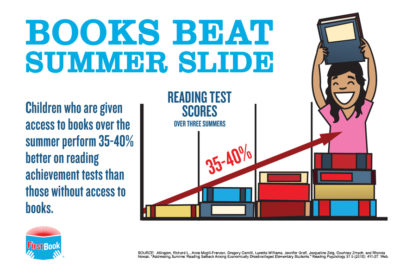 Summer is here! For many elementary and secondary students across the state, it signifies ball games, pools, family vacations, and that longed-for break from school work. But, did you know that a complete separation from activities such as reading and writing could have negative effects on a child’s education?
Summer is here! For many elementary and secondary students across the state, it signifies ball games, pools, family vacations, and that longed-for break from school work. But, did you know that a complete separation from activities such as reading and writing could have negative effects on a child’s education?
Summer setback, also known as “summer slide” or “summer learning loss,” occurs when children lose academic skills during the summertime, when they are most often out of practice.
 Research Findings on Summer Slide
Research Findings on Summer Slide
- Children in low-income households fall behind an average of 2 months in reading during the summer. And, summer slide is cumulative, with these learning losses building up each summer.
- Summer learning loss accounts for two-thirds of the 9th grade achievement gap in reading between students from low-income households and their higher-income peers.
- Students from low-income households with access to books over the summer see significantly more gains in reading scores from spring to fall than students from high-income households with access to books and those from low-income households without access to books.
- Differences in children’s summer learning experiences during their elementary school years can ultimately impact whether they earn a high school diploma and continue to college.
- The effects of summer setback cumulate from year to year, leading to lower proficiency levels in the long sun, as seen by over 100 years’ worth of studies focused on this topic. Students with unequal access to educational opportunities over the summer are less likely to graduate high school on time or even enter college.
So, how can we combat summer setback and help our children reach their highest achievements?
- Take advantage of opportunities in the community: 95% of libraries offer summer reading programs for students—check them out! Stay in-the-know with what’s going on at local art museums, science centers, school programs, and more. Not only do these programs invite children to try new things, but they participate in crafts and activities and can be socially interactive with their peers.
- Make fun books accessible: Whether you have them at home, on your e-reader, in your purse, or at the library, make books easily accessible. Let children select the topics they want to read about. Studies show that children are more likely to read—and keep reading—if they are excited about the content. Studies also show that even reading six books over the summer helps to reduce summer reading loss.
- To-Go Packs: Summers are often busy times for everyone. Purchase or make travel packs to include math problems, writing prompts, trivia questions, and other activities that sneak in educational opportunities in enjoyable ways.
- Converse: Converse with your child. Open dialogue exposes your child to new ideas and vocabulary words. Go for a walk and talk about the trees, using descriptive adjectives. Talk about the food you’re eating to describe the flavors, cultures, or the science behind how they are made.
- Play games: Games are a fantastic way to fit in educational experiences. Playing board games can encourage creativity, reading and math skills, communication, teamwork, and sportsmanship.
Additional Resources
- Kids Who Read Beat Summer Slide, First Book
- Smarter Summers, Brighter Futures (National Summer Learning Association)
To find out more about how your child can avoid ‘Summer Slide’, sign up for the Summer Reading Program at your local public library!
# # #
